The Summer Hangover and Back-to-School… Already?
“Back-to-school has me so excited but so stressed, I’m pretty sure my coffee needs a coffee.”
- A Duck’s Therapist Parent
I was talking to a friend the other day, and she reminded me that school started in two weeks! I'm not sure where I’ve been, but apparently summer is over. Toward the end of summer, it feels like everyone’s running on fumes, exhausted in one way or another. (Case in point: me completely forgetting when school starts). Parents, especially, often find themselves caught in a whirlwind of emotions and responsibilities. The summer months are a juggling act—keeping kids entertained with camps, outings, and spontaneous adventures while balancing work deadlines, household chores, and personal sanity. The transition back to school can feel like both a relief and a new source of stress. Yes, there is such a thing as a summer “hangover”…
This fatigue is normal. Parents often feel a desire and a pressure to make summer “magical” for their kids, which can frequently lead to burnout, stress, or anxiety. The key is to acknowledge your efforts—you’ve kept your kids engaged, safe, happy, and alive.… Even though you may have wanted to kill them a couple of times, you didn’t! Yay! You did all of this and more, all while managing your own responsibilities and obligations. As summer ends, give yourself permission to let go of any guilt about not doing “enough” and focus on the fresh start the school year offers.
That fresh start, though, can come with its own pressures—especially when you realize school is just around the corner and you’re not ready. Many of us have learned the hard way that waiting until the last minute leads to a frantic scramble. We start randomly piling on tasks, such as buying every item on the optional school supply list, or attempting the crazy Pinterest cupcakes for the first day.. I’m not a baker, but I somehow convince myself that I can make minion cupcakes in 2 hours the night before school starts??? Hmm..
Here’s the truth, gleaned from countless parents who’ve felt crushed by this self-imposed stress: kids don’t care nearly as much about these details as we do. So, who are we really doing all this for? We say it’s for our children, but often, it’s about soothing our own need to feel like we’re doing “enough.” Spoiler alert: “Enough” doesn’t mean boxes of brand-new clothes or minion cupcakes. Some things genuinely make a difference for our kids; others, they might not even notice. Let’s stop exhausting ourselves with unrealistic expectations and focus on what truly matters. If you love going all-out, that’s great!—do it because it brings you joy, not because you feel obligated to check off some arbitrary list to prove you’re a “good” parent. With just a couple of weeks left for some, longer for others, here are some things to think about to help you take some pressure off yourself.
“I asked my kid what they’re excited about for school, and they said, ‘Recess.’ I’ve never related to anything more.”
- A Duck’s Therapist Parent
Create A Checklist:
School Supplies: A detailed list is your best friend. Use it to stay organized, not as a way to critique yourself. Check your school’s supply list for essentials such as notebooks, pencils, crayons, and any other required items. Reflect on last year and discuss with your kids what they actually used. Those fancy mechanical pencils might sound cool, but they’ll probably still reach for that chewed-up, eraser-less, one-inch pencil from four years ago. …. Now take that $4 saved and buy yourself a bagel!
Clothing: You can purchase items new or used. Assess what clothes still fit from last year and check out thrift stores or online used clothing retailers to save some money. Kids don’t know whether the shirt they like was $5 or $35…. If they like it, they will wear it 3 days a week, regardless of where it came from. If you’re reusing items from last year, like a backpack in good condition, involve your child in cleaning or decorating it to make it feel new.
Health and Administration: Schedule any necessary doctor or dental appointments, and update emergency contact information.
Extracurriculars: Research after-school programs, sports, or clubs your child might want to join.
Home Organization: Set up a homework station with supplies, a calendar for tracking assignments, and a designated spot for backpacks and shoes. Will that spot stay “designated” for long? Probably not, but it’s worth a shot.
Not every child needs a brand-new wardrobe or the trendiest supplies. Kids thrive on consistency, love, and support—not material perfection. Children’s academic success and emotional well-being are more closely tied to positive parent-child relationships than to material possessions. Focus on what matters.
Support Emotional Readiness
The back-to-school transition can evoke a range of emotions in kids, from eagerness to see friends to nervousness about a new classroom or academic challenges. Addressing these feelings early can reduce anxiety and boost resilience. Create a safe space for your child to share their thoughts about the upcoming school year. Ask open-ended, non-judgmental questions like, “What’s one thing you’re excited about for school?” or “Is there anything making you a little nervous?” For younger kids, try prompts like, “What do you think your new teacher will be like?” to spark discussion. For teens, ask about specific concerns, such as managing their new work schedule with school or the fight they had with their friend over the summer. Listen actively—nod, maintain eye contact, and refrain from offering solutions too quickly. Validate their feelings and help them understand what they are feeling. Oftentimes, teens don’t want answers or solutions to their problems. They are at a developmental stage where they crave autonomy. They may not want you to fix their problems, but rather to listen as they work through their thoughts on their own.. You can guide as best you can, but take the pressure off to know exactly what to say. If they are talking and you are listening, that is often all they want.
Some kids, especially younger ones or those who are shy, may struggle to articulate their feelings. Try creative approaches to get the conversation flowing. For younger kids, draw pictures together about “what school will be like” and ask them to describe their drawings. For older kids, use casual moments—like car rides or dinner—to ask light questions, like, “What’s one thing you hope happens at school this year?”.
Check out the worksheets to help support your child as they return to school!
Foster Independence
Empowering kids to take charge of their routines and responsibilities not only builds confidence but also fosters a growth mindset, preparing them for the school year while reducing their reliance on parents for every step. Teach them to organize their space by packing their bags or laying out clothes the night before, using simple checklists for younger kids or a designated homework station for older ones to instill a sense of ownership. Set goals together, helping them identify one academic goal, such as improving handwriting, and one personal goal, like trying out for soccer, to give them a sense of purpose and direction. Practice problem-solving through role-playing scenarios like forgetting homework (“What would you say to your teacher?”) or handling a friend disagreement (“How could you work it out?”), which builds critical thinking and resilience in a low-pressure, supportive way.
The Comparison Trap For Parents
The back-to-school season often feels like a social media frenzy, with feeds flooded by picture-perfect moments—kids in pristine outfits and put-together parents (I usually don’t even manage a shower). As parents, we pour our hearts into giving our kids the best. But social media can be a deceptive trap, tempting us to measure our worth against curated snapshots of other families’ lives. Those three-second photos—showing off a child’s “perfect” first-day pose—capture a mere 0.001% of reality. Behind the scenes, those same kids might be running late, losing shoes, yelling over misplaced homework, or staining their brand-new pants with ketchup. Yet, we’re quick to believe that a fleeting image reflects someone’s entire experience and then judge ourselves against it.
Social media often fuels anxiety and self-doubt, especially during the high-pressure back-to-school rush. If you find yourself spiraling into harsh comparisons (like most of us do), consider a break—delete those apps from your phone for a few weeks and notice how you feel. No matter what polished posts you see, remember: you’re only glimpsing a tiny sliver of the story, not the 99.999% of chaos and real life happening off-screen.
Your worth as a parent isn’t defined by a filtered photo—it’s in the everyday moments of showing up for your kids.



